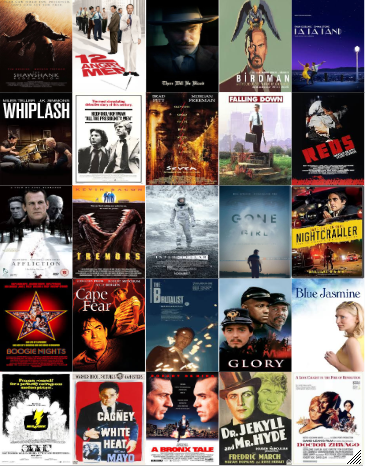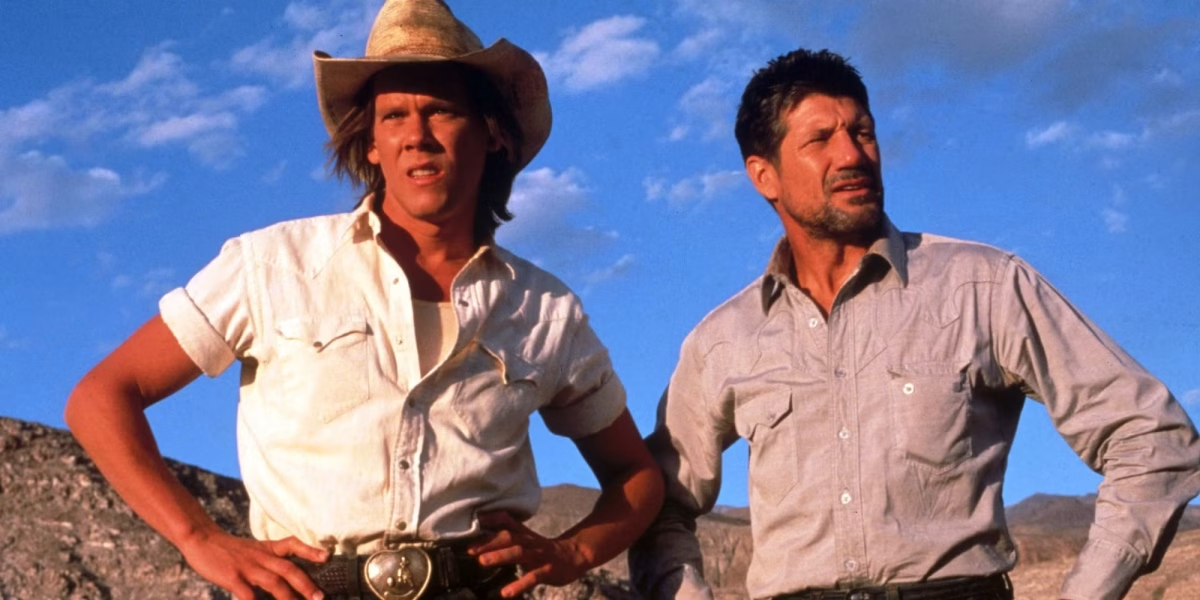Adding Insult to Injury: the Eighth Democratic Debate
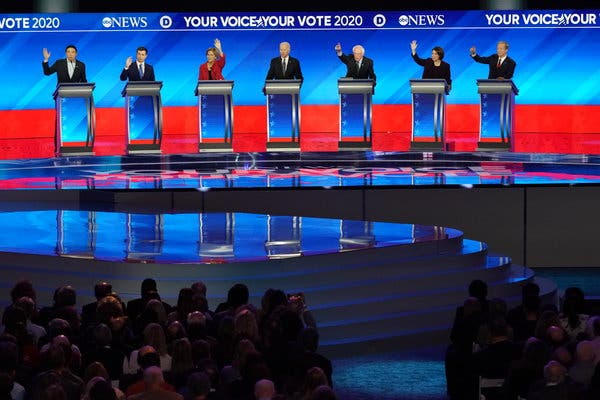
Following a muddled caucus in Iowa, seven Democratic primary candidates gathered in New Hampshire, the next state to vote, for a fractious debate which served only to highlight the volatility of the field. From left to right: Andrew Yang, Pete Buttigieg, Elizabeth Warren, Joe Biden, Bernie Sanders, Amy Klobuchar, and Tom Steyer. Photo credits: Chang W. Lee/The New York Times
MANCHESTER, NEW HAMPSHIRE—It has not been a good week for the Democratic Party. The crowded primary’s sky-high hopes for the Iowa caucuses, the first in the nation, imploded spectacularly on Monday night as the vote results were delayed for days on end and resulted in a split and inconclusive verdict for Pete Buttigieg and Bernie Sanders. In his third State of the Union President Donald Trump crowed on Tuesday night ahead of his imminent impeachment acquittal, enraging Speaker of the House Nancy Pelosi into shredding the copy of the speech presented to her in a made-for-television moment. Then on Wednesday, Trump was acquitted on party lines (save for Utah Republican Mitt Romney’s vote for the abuse of power article), ending the months-long impeachment saga which had devoured much of the Democrats’ political capital and time.
On Friday, the candidates veritably limped their way onstage for the eighth Democratic primary debate, hosted by ABC News on February 7, 2020 at Saint Anselm College in Manchester, New Hampshire. While Iowa has traditionally served as a political sieve that filtered out unviable candidates, the muddiness of the results has served to blunt their impact, and in fact the eighth debate featured more candidates than in the seventh debate in January and the same number as the sixth debate in December (for my coverage of the previous two debates, the links are here for January are here for December). Andrew Yang rejoined the cohort of candidates after missing the January debate, rounding out the group of seven: Joe Biden, Bernie Sanders, Elizabeth Warren, Pete Buttigieg, Amy Klobuchar, and Tom Steyer.
Of the seven, Vermont Senator Bernie Sanders is the one most clearly poised to carry forth momentum to a success in the New Hampshire primary, scheduled to be held on February 11, 2020. Sanders had won a popular vote victory in the Iowa caucuses (though Buttigieg edged him out in terms of state delegates) and had surged in recent polls, both nationwide and in New Hampshire, showing him with a frontrunner status in both. Sanders had always been heavily favored to win New Hampshire, enjoying a considerable neighboring-state advantage and having won it by 20 points in the 2016 primary against eventual nominee Hillary Clinton, but his campaign’s recent burst of energy has all but guaranteed it.
Alone among the candidates Sanders appeared confident and relaxed at the debate, batting aside questions about his perceived “electability” as a self-identified democratic socialist by pointing out he had won 25% of the Republican vote running for statewide office in Vermont. When pressed on his ability to compromise he pointed out his ability to negotiate amendments in the House of Representatives over the course of his long career, during both Democratic and Republican periods of control. Sanders was probed on his record on gun rights—he was slower than many of his fellow candidates in embracing gun reform, being from rural and heavily pro-gun Vermont—but largely escaped unscathed throughout the night, with the moderators and candidates clearly unwilling to attack a highly popular figure in the party.
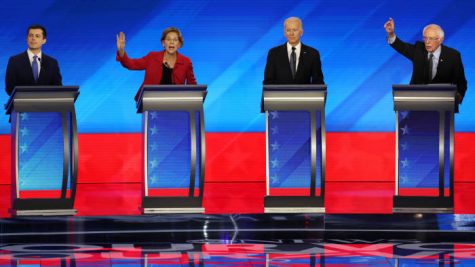
The same could not be said for his fellow Iowa victor, former South Bend, Indiana Mayor Pete Buttigieg. Having scraped past Sanders with the barest of margins in the state delegate count, with only 26.2% to Sanders’s 26.1%, Buttigieg’s rise to the top was nonetheless remarkable for a candidate who was entirely unknown on the national scene two years ago. The 38-year-old had catapulted himself into the top tier of candidates by stressing his youth and generational appeal, selling himself as a barrier-breaking fresh face in the vein of John F. Kennedy, Bill Clinton, and Barack Obama. Along the way, however, he had tweaked some egos with his downplaying of experience as a prerequisite for office, and on Friday he was once again subject to renewed scrutiny.
Buttigieg was cross-examined relentlessly throughout the debate by numerous candidates, in particular Minnesota Senator Amy Klobuchar, continuing their long-standing feud stretching back to the fifth November debate over his curt dismissal of Washington experience. Klobuchar snapped that it was easy to play the role of the “cool newcomer” but the presidency was better off in more experienced hands. Buttigieg was also notably criticized by former Vice President Joe Biden, who in a set of attack ads aired on Saturday pointedly described him as “no Obama” and mockingly compared his record in South Bend “installing decorative lights beneath bridges” with Biden’s decades-long experience in the Senate and the White House.
It was on the issue of racial justice, however, that Buttigieg fell most short. His strong performances in lily-white Iowa and New Hampshire disguises a crippling inability to win support in the heavily diverse states of Nevada and South Carolina, where he remains mired in the single digits. Moderator Linsey Davis grilled Buttigieg over his tenure as mayor of South Bend, which saw a rise in marijuana-related incarcerations of African-Americans to a level four times more than white residents. Buttigieg attributed these to “systemic racism” in the system, dodging the question of his own role specifically.
Davis then punted the same question and whether it was a “substantial answer” over to Massachusetts Senator Elizabeth Warren, who bluntly replied, “No”. Warren went on to explain that it was important to “own up to the facts about how race permeated our justice system.” The criticism of Buttigieg’s racial justice record, however, was the only major attack that Warren sounded in the debate; hovering on the cusp of viability at 15% nationally, she has instead pivoted to promoting herself as the “unity candidate” capable of bridging the progressive and moderate camps within the party, and so on the debate stage she largely refrained from overt criticisms of her fellow candidates.
Coming hot on the heels of her third-place Iowa showing, overperforming poll expectations and decisively beating former frontrunner Joe Biden, Warren surely had the temptation to aim for a viral moment in hopes of a strong showing in New Hampshire. The Granite State is crucial for her candidacy, if not essential, but given an opportunity by the moderators to draw a stark contrast between Sanders’s democratic socialism and her self-proclaimed status of being “capitalist to her bones”, Warren notably demurred, eschewing the chance to attack her fellow progressive and instead focused on her message of unity.
Former Vice President Joe Biden clearly chose the opposite strategy following his disastrous showing in the Iowa caucus, placing fourth behind Sanders, Buttigieg, and Warren. Considered unanimously to be the frontrunner for months, Biden’s poor showing in Iowa saw him take a nosedive in national polls, and a loss in New Hampshire would deal a second serious blow to his electability argument. The Biden campaign has all but conceded New Hampshire as well, with Biden oddly declaring at the beginning of the debate that “I took a hit in Iowa, and I will probably take a hit here”.
However, Biden ended up having one of his best debate performances so far, strengthening especially in the second hour of the debate with a spirited exchange with Sanders over his record on gun rights (especially the Brady Bill) and sparring extensively with Buttigieg over experience and generational change. It was on the topic of impeachment, however, where Biden was most authentic and convincing. The entire Ukraine scandal hinged on Trump’s attempt to investigate Biden’s son Hunter for shady business ties, and Biden feistily denounced Trump for targeting his family and especially for firing impeachment witness Lt. Colonel Alexander Vindman earlier that day. Biden then led the audience in giving a standing ovation to Vindman, urging them to “stand up and clap for Col. Vindman.”
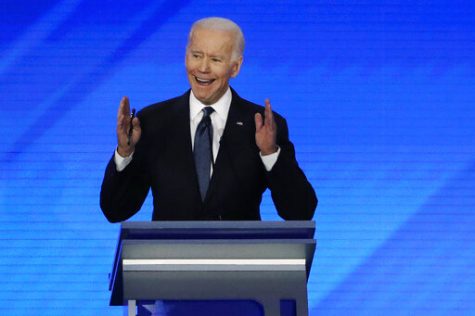
Following a dismal showing in Iowa and a freefall in the polls, former Vice President Joe Biden gave a spirited performance, at one point calling for the entire audience to give a standing ovation to Lt. Col. Alexander Vindman, who had been ousted by President Trump for his role in impeachment. Photo credit: AP Photo/Elise Amendola.
Minnesota Senator Amy Klobuchar also received widespread media attention for her solid performance in the debate, effectively challenging Buttigieg on experience. The threeway battle for the standard of the establishment moderates in the party between Klobuchar, Buttigieg, and Biden was on full display Friday as the three repeatedly challenged one another. Klobuchar placed a close fifth behind Biden in Iowa, and overtaking him in New Hampshire would give her a much-needed boost to continue onto Nevada and South Carolina, where similar to Buttigieg she suffers from low minority support.
Unlike Buttigieg, however, Klobuchar addressed the issue of race head-on, making persuasive points on the problems of Republican gerrymandering and voter purges unfairly impacting voters of color. Alone among the candidates, too, Klobuchar seized the chance when the moderators asked if anyone was “concerned about having a democratic socialist at the top of the ticket” and criticized Sanders for being too divisive, saying that “we are not going to be able to out-divide the divider-in-chief”. Nonetheless, the two shared an amicable moment when the moderators brought up Hillary Clinton’s recent comments that “nobody likes [Bernie]”—Klobuchar was quick to repudiate the claim, pointing out their work together lowering prescription drug prices, while Biden walked over to hug Sanders onstage.
The race has largely consolidated around the five major candidates of Biden, Sanders, Warren, Buttigieg, and Klobuchar, with the two additional hangers-on of Tom Steyer and Andrew Yang largely being sidelined throughout. Oddly, Steyer was the first candidate to bring up the topic of racial equality, chiding the moderators and his fellow candidates for ignoring the voices of the most important demographic in the Democratic Party, while Yang, yet again the only candidate of color onstage, chose to shy away from social justice issues and instead chose to plug his Universal Basic Income (UBI) of $1000 a month for all American citizens. Both are polling less than 5% in New Hampshire, but while Steyer at least has a path forward in Nevada and South Carolina where he has been saturating the airwaves with advertisements, Yang’s campaign is more or less entirely dependent on a strong showing in the Granite State at this point.
And, of course, Michael Bloomberg looms over the race, waiting for the Super Tuesday primaries in early March where his net worth of $54 billion will come into play. Bloomberg has already overtaken Klobuchar and Buttigieg in national polls, benefitting from Biden’s precarious slip, but has again essentially boycotted the debate. He has refused to collect any donations (one of the qualifications was a donor threshold of over 225,000 unique donors), but that will change for the Nevada debate on February 19, 2020, which operates under different requirements to accommodate his presence. Throughout the debate, the seven candidates criticized Bloomberg extensively, with Warren in particular focusing on Bloomberg allegedly “buying his way into the election”.
With a deeply divided primary riven between moderates and progressives, the eighth Democratic debate did nothing to heal those divides—if anything, it served to highlight them more starkly. Coming so closely on the heels of an Iowa disaster and the hyperpartisan impeachment debacle, the debate seemed only to add insult to injury for the party, doing nothing to assuage the increasing fears that the Democrats seem to face an uphill battle against President Donald Trump in the general election. New Hampshire will certainly clarify the field to some degree, but as the race continues to slog on the field remains highly volatile. Anyone could still win, and everyone could still lose.

Vincent Jiang is currently a senior at West Morris Central High School and President of Journalism Club. Passionate about global affairs, he enjoys writing...





















